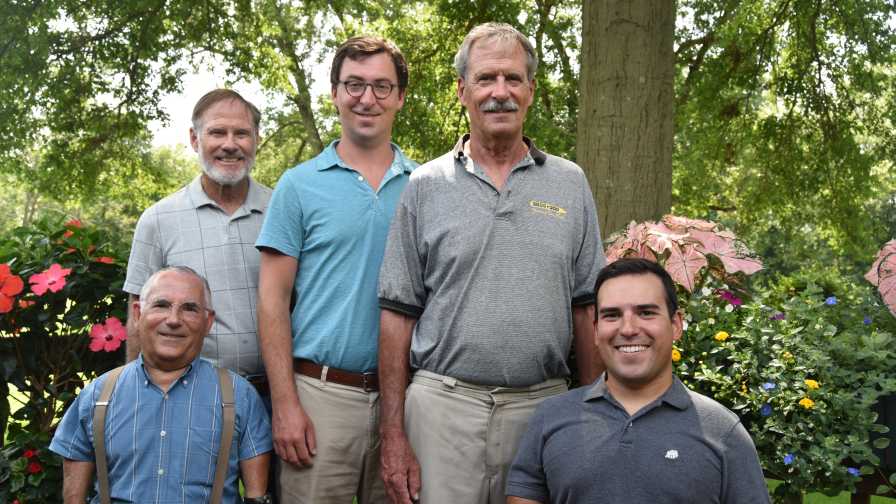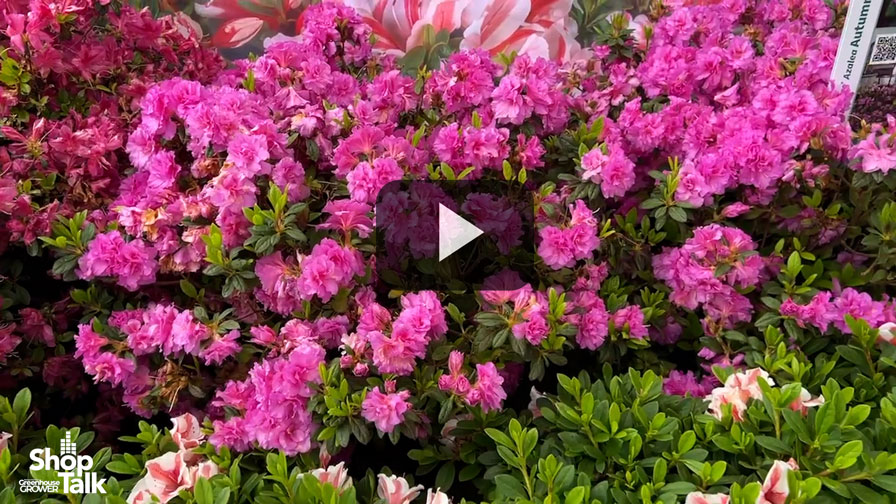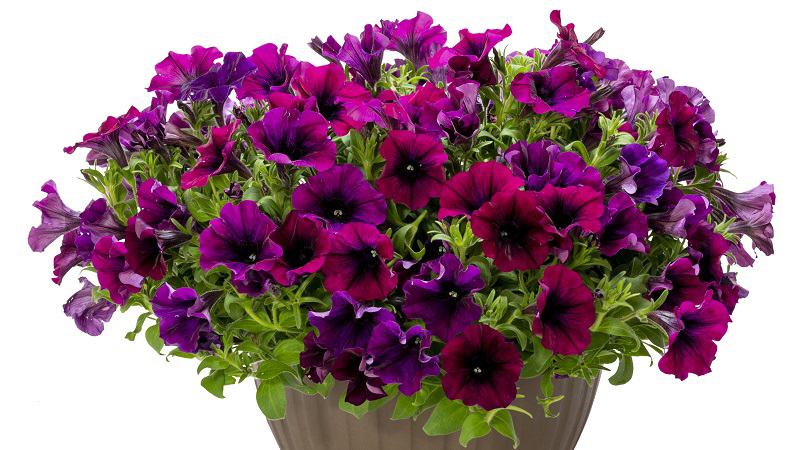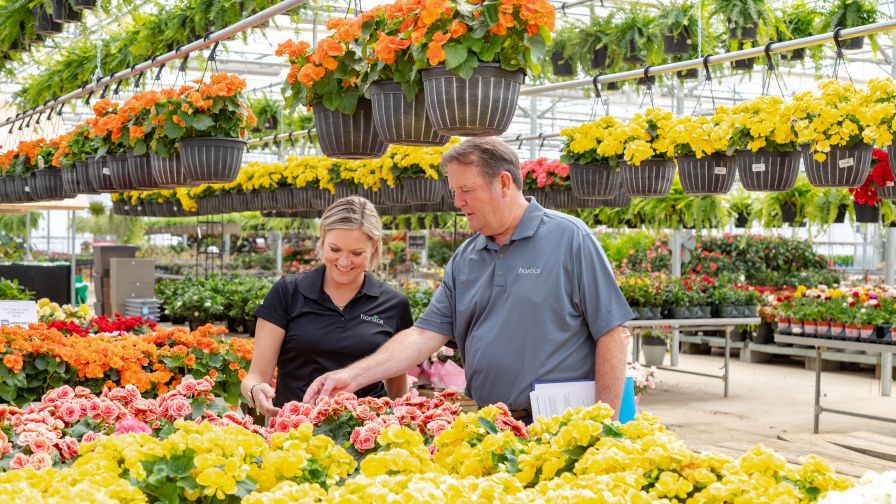How Kube-Pak Has Taken Plant Production From an Uncertainty to a Science

The Swanekamp Family (backrow left to right): John Swanekamp, Rob Swanekamp Jr., Rob Swanekamp Sr.; (front row left to right) Bill Swanekamp and Sean Swanekamp
For Kube-Pak, Greenhouse Grower’s 2019 Operation of the Year honoree, measuring success is a two-horse race.
For one, the production aspect of the company is regarded separately from the business side of things, allowing the 55-plus year, third-generation operation run by the Swanekamp family to steward both sides of the business independently.
“As my banker often says, we run a conservative business, meaning we’ve grown the business,” Owner Bill Swanekamp says. “But we’re not expanding too rapidly like some of the guys we’ve seen go out of business over the last few years.”
“How can we get more out of what we already have, or what additional crops can we grow?” he says. “What extra turns can we get by doing things during the shoulders or the slow period of times? That’s the business philosophy.”
The growing philosophy at Kube-Pak is a fairly straightforward one: “We always produce the best crops possible. Bottom line.”
Greenhouse Tech Pioneers
Another long-standing tenet at Kube-Pak is embracing innovation and staying on the upward arc of the adoption curve.
“You can go back to the early 60s when we were the first greenhouse in the world to have double-inflated poly installed on the roof, and nobody had invented a drum seeder for flower seedlings until our drum seeder, which could sow 1,200 trays per hour,” Swanekamp says. “This was a one-of-a-kind machine.”
The Swanekamp family’s long-standing affair with technology doesn’t finish there. The company also built the first solar-powered greenhouse in Allentown, NJ, right around the time of the Oil Embargo in 1973, and it turned over a spare key to nearby Rutgers University so the school could conduct cutting-edge research.
That tradition continues today. Having just returned from the annual Cultivate show in Columbus, OH, Swanekamp shared that Kube-Pak just purchased a new automated transplanter.
From Uncertainty to Science
Like any business that hangs around for a half-decade plus, Kube-Pak has faced many unique challenges to its organizational sovereignty.
“People think it’s not hard to be a grower, and it’s true,” Swanekamp says. “You only need to know 50 things, but the problem is you really only learn one of those things per year, so it takes a good 50 years to get good at what you’re doing.”
To illustrate his point, Swanekamp recalls a situation that popped up back in the early 90s.
“We had some growers at the time who were good. They were good people, so this is not a personal attack on them, but growing plants back then wasn’t the science it is today,” he says. “So, I took a class up at Michigan State University taught by Dr. Rodger Styer and Dr. Dave Koranski, both were considered the leading plug experts at the time.
“For those three days, we received the most intense education about the science of growing, and what allows you to have repeatable success as a grower year after year. We came back from that class and completely changed the way we grew, from guessing to knowing, from uncertainty to science.”
What did Swanekamp learn from that experience? That growing knowledge from the top of the organization down to its lowest levels is crucial to long-term, repeatable success.
“You have to appreciate that I was never a grower. I went to business school,” he says. “That whole deal taught us a powerful lesson — that I as the owner needed to know how to grow these crops. It completely changed the way that we grow.”
Biological Products on the Forefront
One area that Kube-Pak has openly embraced is an organizational commitment to using biological products.
“It’s been about seven or eight years now of us using biologicals, and we’ve learned a great deal about it,” Swanekamp says. “When we give facility tours to groups, we focus quite a bit of that content on those biologicals, because they’re not getting that (type of education) in college and we want them to understand that these are viable options.”
How viable?
Well, as Swanekamp tells it, about seven years ago, Kube-Pak was growing a hanging basket crop of calibrachoa. The grower at the time treated those baskets with all the same crop protection chemicals he normally treated with, and as spring arrived the thrips just ate them alive, destroying 10,000 baskets and costing the company $100K.
“The chemicals were no longer working, and this was something we actually saw coming — the overuse of chemicals and lack of efficacy — so we started to work with biologicals,” Swanekamp says. “That first year we used a biological dip of BotaniGard, nematodes, and RootShield, and then added a sachet of Amblyseius cucumeris. We did not throw a single basket away that next year because of thrips damage.”
The one year of hard chemistry failure notwithstanding, Swanekamp and Co. are big proponents of a fully integrated pest management approach that includes both hard and soft chemistry.
“There is this whole kind of religious fervor around biologicals that says you don’t ever need chemicals, and over the years we’ve found that to just not be true at all,” Swanekamp says.
Another 50 Years of Kube-Pak? It’s Pretty Likely
In the near term, the third generation of Swanekamps is poised to take over the business, most having worked in the business for the last 10 to 15 years.
“The second generation is myself and my cousin John, who retired this year,” Swanekamp says. “I’m going to semi-retire at the end of this year, and then Rob will probably stay on for a little more time.”
Current plans call for Bill Swanekamp’s son, Sean, to take over the production side and shipping from the greenhouse. Bill’s nephew, Rob Jr., is tasked with taking over all the programming (Kube-Pak writes its own enterprise resource planning [ERP] software in-house).
“So, when it comes to succession planning and the next generation at Kube-Pak, we’d say we’re in pretty good shape in that regard,” Swanekamp says.









